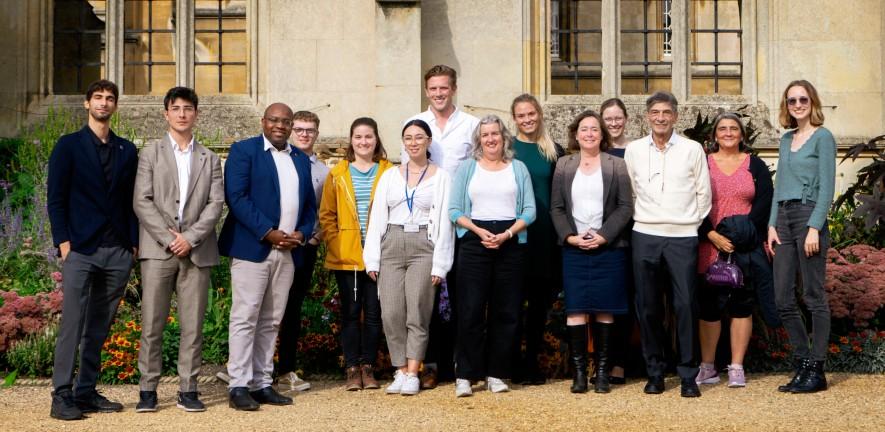
Submitted by Jane Durkin on Mon, 10/10/2022 - 15:22
A workshop on ultrasound tongue imaging (UTI), supported by Cambridge Language Sciences, brought together phoneticians, computer scientists, neuroscientists and speech & language therapists from across the University of Cambridge campus.
The workshop, convened by Dr Calbert Graham, Senior Research Associate in Theoretical and Applied Linguistics, took place at St John’s College on 21 and 22 September.
The aim was to develop skills across different University departments in the use of ultrasound imaging to visualise the shape and movements of the tongue during speech production.
Recent advances in technology mean that ultrasound is an increasingly useful tool for speech research.
Dr Graham said “Ultrasound tongue imaging (UTI) is a safe, non-invasive and relatively low-cost imaging modality for viewing and recording the movement of the surface of the tongue. It has greatly enhanced our understanding of how sounds are articulated with the tongue. This information can be very valuable to speech researchers, speech-language pathologists and language educators.“
Dr Graham partnered with specialists from Telemed Medical Systems, a leading ultrasound company in Italy focused on medicine, research, engineering and industry, to deliver the two-day workshop. The workshop combined theory with practical applications and hands-on training.
Dr Graham said "It has been a great pleasure welcoming the Telemed team to Cambridge and St John's College. We are very grateful that they have so generously shared their knowledge and expertise in ultrasound technology with us, as we try to establish our own ultrasound facility in Theoretical and Applied Linguistics. I was particularly interested in presentations on UTI as a visual biofeedback tool for improving second language pronunciation and for treating speech sound disorders in clinical contexts."
Tim Laméris, a PhD student in Theoretical and Applied Linguistics who attended the event said: “It was great to learn about ultrasound technology and its applications, and very refreshing to hear about how people from different areas of languages sciences could apply it in their work”
Dr Lucy Southby, Lead Specialist Speech & Language Therapist at East of England Cleft Lip & Palate Service, Addenbrooke’s Hospital, and Senior Research Associate at the Bristol Speech and Language Therapy Research Unit also attended the workshop. She said “The use of ultrasound as biofeedback in Speech and Language Therapy for children with cleft related speech sound disorder is a really interesting emerging area and one we have been talking about exploring in our team for a while.”
Leah Moors, Advanced Specialist Speech and Language Therapist in Cleft Palate & Velopharyngeal Dysfunction, another attendee from Addenbrooke's, said: “It was really useful to learn about ultrasound imaging and the potential use in treating children with entrenched speech sound disorders. The Team delivering the training were passionate about their subject and this made the training very engaging. Dr Graham has been very generous in his willingness to collaborate with Speech Therapists from Cambridge University Hospitals Foundation Trust and we look forward to a constructive and beneficial working partnership.”
We would like to thank Vito Moccia, Alessandro Pascone and Emanuele Moccia from Telemed for leading the training sessions with Dr Graham.
Photo credit: Emanuele Moccia. Attendees from left to right: Emanuele Moccia, Alessandro Pascone, Calbert Graham, Ben Palmer-Welch, Julia Schwartz, Alice Paver, Tim Laméris, Jane Walsh, Hannah Chandler, Brechtje Post, Lucy Southby, Vito Moccia, Leah Moors, Marju Kaps. Attendees not in the photo: Kirsty McDougall & Lydia Doherty.
